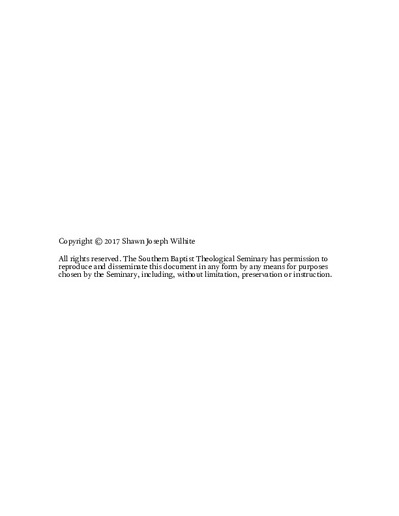“One of Life and One of Death”: A Critical Assessment of Apocalypticism in the Didache’s Two Ways
Abstract
This dissertation seeks to answer the following question: If ancient Jewish and Christian Two Ways texts have a common literary structure and reoccurring apocalyptic dualisms, how and why does the Didache neglect to frame the Two Ways with an apocalyptic worldview? The thesis argued that the Didache’s Two Ways coheres with an ancient apocalyptic Two Ways genre, yet the Didachist does not incorporate the apocalyptic features, dualistic connotations, and the two spirits scheme to maintain a purely ethical version of the Two Ways.
Chapter 1 summarizes the history of scholarship and generational Didache studies as they have inquired about the apocalyptic undercurrents of the Didache’s Two Ways.
Chapter 2 examines historical scholarship and reception of John J. Collins’s work on apocalypticism and joins this work to the study of the Two Ways. Lists of texts, a typology of salient apocalyptic features, and summaries of the ancient Two Ways reveal the undercurrents of an apocalyptic worldview beyond a two angels scheme.
Chapter 3 offers a close critical reading of ancient Two Ways texts that are often compared with the Didache’s Two Ways. The argument focuses upon the apocalyptic features of the Treatise of the Two Spirits (1QS III, 13–IV, 26); Testament of Asher; Galatians 5:16–24; Barn. 18.1–21.1; De Doctrina; and Herm. Mand. 6.1–2 (35–36).
Chapter 4 builds upon the work of Nancy Pardee’s delimitation of the Didache and argues for the Didache’s Two Ways to comprise of material in Did. 1.1–6.2. Textual cohesion, discourse boundaries, and comparison with other ancient Two Ways reveals that Did. 1.1–6.2 is uniquely structured and assimilates unique material into the Two Ways literary frame.
Chapters 5 and 6 collectively argue that the Didache’s Two Ways lack an apocalyptic worldview that is often associated with a Two Ways genre. Assessing the literary frame and selected readings within the Didache’s Two Ways, I demonstrate how the Didache does not include common apocalyptic undercurrents of an ancient Two Ways genre.

